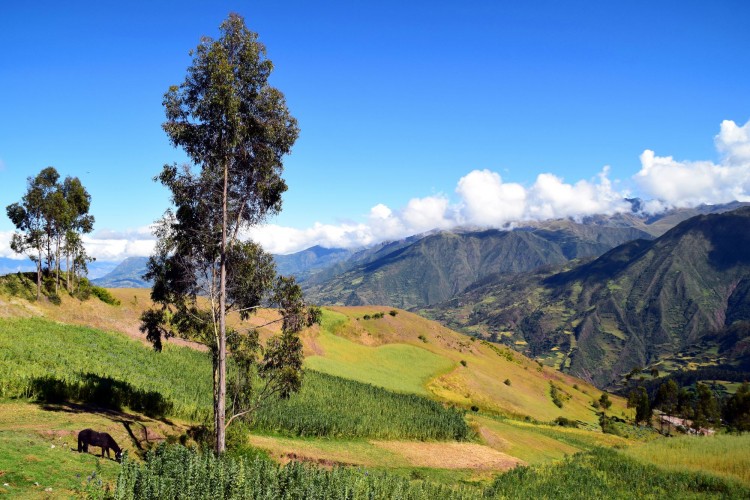Context
Ecosystems contribute to climate change mitigation because of their capacity to remove carbon from the atmosphere and to store it. They also contribute to adaptation to climate change because they provide services that can help people face both current climate hazards and future climate change, for example through flood reduction, landslide avoidance, microclimate regulation, and the supply of diversified food. In the tropics, biodiversity and ecosystem services are affected by rapid land-use changes, such as agricultural expansion in forested landscapes, which has major implications for climate change mitigation and adaptation.
Policy and management interventions have been designed in Peru to protect or restore ecosystems and enhance the contribution of ecosystem services to human wellbeing, particularly in relation with water regulation, food production, soil protection and adaptation to climate change. However, the management of multiple services across landscapes is challenging, given that trade-offs between services often occur over space and time, for example, where increasing food production leads to decreases in water regulation and carbon sequestration.
Although many ecosystem management activities can jointly contribute to adaptation and mitigation strategies, climate policies have generally treated these strategies separately. In recent years, there has been a growing interest shown by practitioners and policymakers in agriculture, forestry, and landscape management in linking the two strategies and enhancing the synergies between ecosystem services, for example between carbon sequestration and water regulation.
Objectives
This exemplar aims to assess multiple ecosystem services in the Mariño watershed in the Apurimac region of Peru, analyze the tradeoffs among services (including climate-relevant services such as carbon, water, food and medicinal plants), understand the implications of ecosystem changes on people benefiting from ecosystem services (winners and losers), and explore how power relationships between stakeholders influence the management of ecosystem services.
Similar research on tradeoffs between ecosystem services has been conducted in this exemplar in other tropical countries, such as Costa Rica and Indonesia. In addition, research in this exemplar has explored the opportunities and trade‐offs of managing ecosystems for both climate change mitigation and adaptation. We have analyzed how policy development has integrated adaptation and mitigation in Peru, Brazil, Indonesia, Vietnam, and the Philippines. We have also analyzed how global climate project portfolios and climate funds consider the integration of adaptation and mitigation.
Case study description in Peru
The small Mariño watershed (500 km2) is located in the province of Abancay, Apurímac region, in the Peruvian Andes. It is characterized by a very rugged topography, steep slopes, and high altitude (from 1900 to 5300 masl at Ampay glacier). It presents a great diversity of flora, fauna and ecosystem types, including subtropical thorn woodland, subtropical montane wet forest, and subtropical alpine rain tundra. Agriculture is the main livelihood activity with maize, potato and beans as main crops. Main social and environmental challenges include poverty and water scarcity.
Findings
The concept of ecosystem services, with its broad definition and its consideration of multiple values through multidisciplinary analyses (beyond economic or monetary values alone), is useful for decision-making concerning landscapes and territories. Ecosystem services can help stakeholders discuss territorial management at the appropriate spatial level, think long-term as well as short-term, and assimilate multidisciplinary knowledge.
In our case study, beneficiaries of ecosystem services and ecosystem managers have few opportunities to interact with each other. The beneficiaries of the services have little involvement in the management of these services (legislation, monitoring, etc.), and are also less in contact with other actors apart from the managers, placing them in a peripheral position in the actors' network.
Ecosystem services approaches can contribute to territorial management by creating networks and strengthening relationships between actors, especially between those managing ecosystems (e.g., farmers) and those benefiting from these services (e.g., downstream users of water). By highlighting the multiple benefits provided by ecosystems, the concept makes it possible to involve actors in the management of the ecosystems on which they depend without often recognizing it, for example hydroelectric companies with upstream forests.
The concept of ecosystem services makes it possible to think of ecosystems not as objects threatened by the territory's economic development, but as elements to be considered in the planning of this development.
Blogs:
- Ecosystem services and climate change: Time to get it together on mitigation and adaptation http://operas-project.eu/MitigationvsAdaptation
- Servicios ecosistémicos bajo un enfoque de paisajes http://www.cifor.org/es/corporate-news/servicios-ecosistemicos-bajo-un-enfoque-de-paisajes/
- Smart reforestation must go beyond carbon http://blog.cifor.org/28542
- The importance of climate adaptation finance for forests http://blog.cifor.org/20197
- New research seeks to gauge forests’ role in climate adaptation http://blog.cifor.org/23430
- Combining climate-change adaptation and mitigation: a win-win option http://blog.cifor.org/20188
- Biodiversity “hotspots” more likely to have greater ecosystem co-benefits http://blog.cifor.org/19809
Some publications
On ecosystem service tradeoffs:
- Labrière N., Locatelli B., Vieilledent G., Kharisma S., Gond V., Basuki I., Laumonier Y., 2016. Spatial congruence between carbon and biodiversity across forest landscapes of northern Borneo. Global Ecology and Conservation 6: 105-120. http://dx.doi.org/10.1016/j.gecco.2016.01.005
- Vallet A., Locatelli B., Levrel H., Brenes Pérez C., Imbach P., Estrada Carmona N., Manlay R., Oszwald J., 2016. Dynamics of ecosystem services during forest transitions in Reventazón, Costa Rica. PLOS ONE 11(7): e0158615. http://dx.doi.org/10.1371/journal.pone.0158615
- Labrière N., Laumonier Y, Locatelli B., Vieilledent G., Comptour M., 2015. Ecosystem Services and Biodiversity in a Rapidly Transforming Landscape in Northern Borneo. PLOS ONE 10(10): e0140423. http://dx.doi.org/10.1371/journal.pone.0140423
- Locatelli B., Imbach B., Wunder S., 2014. Synergies and trade-offs between ecosystem services in Costa Rica. Environmental Conservation 41(1): 27-36. http://dx.doi.org/10.1017/S0376892913000234
About global analyses of adaptation-mitigation integration:
- Locatelli B., Pavageau C., Pramova E., Di Gregorio M., 2015. Integrating climate change mitigation and adaptation in agriculture and forestry: Opportunities and trade-offs. WIREs Climate Change 6(6): 585-598. http://dx.doi.org/10.1002/wcc.357
- Kongsager R., Locatelli B., Chazarin F., 2016. Addressing climate change mitigation and adaptation together: A global assessment of agriculture and forestry projects. Environmental Management 57(2): 271-282. http://dx.doi.org/10.1007/s00267-015-0605-y
- Locatelli B., Fedele G., Fayolle V., Baglee A., 2016. Synergies between adaptation and mitigation in climate change finance. International Journal of Climate Change Strategies and Management 8(1): 112-128. http://dx.doi.org/10.1108/IJCCSM-07-2014-0088
- Locatelli B., Evans V., Wardell A., Andrade A., Vignola R., 2011. Forests and Climate Change in Latin America: Linking Adaptation and Mitigation. Forests 2(1): 431-450. http://dx.doi.org/10.3390/f2010431
About adaptation-mitigation integration in the policies of selected countries:
- Di Gregorio M., Nurrochmat D.R. Paavola J., Maya Sari I., Fatorelli L., Pramova E., Locatelli B., Brockhaus M., Dewi S.D.K., 2017. Climate Policy Integration in the Land Use Sector: Mitigation, Adaptation and Sustainable Development Linkages. Environmental Science and Policy 67: 35-43. http://dx.doi.org/10.1016/j.envsci.2016.11.004
- Thuy P.T., Moeliono M., Locatelli B., Brockhaus M., Di Gregorio M., Mardiah S., 2014. Integration of adaptation and mitigation in climate change and forest policies in Indonesia and Vietnam. Forests 5(8), 2016-2036. http://dx.doi.org/10.3390/f5082016
- Pramova E., Di Gregorio M., Locatelli B., 2015. Integrating adaptation and mitigation in climate change and land-use policies in Peru. Working Paper 184. Bogor, Indonesia: CIFOR. http://dx.doi.org/10.17528/cifor/005624
- Pramova E., Locatelli B., 2013. Guidebook on integrating community-based adaptation into REDD+ projects: Lessons from Indonesia and the Philippines. Bogor, Indonesia: CIFOR, 72p. http://dx.doi.org/10.17528/cifor/004340
Contact:
Bruno Locatelli (CIRAD-CIFOR), b.locatelli@cgiar.org

